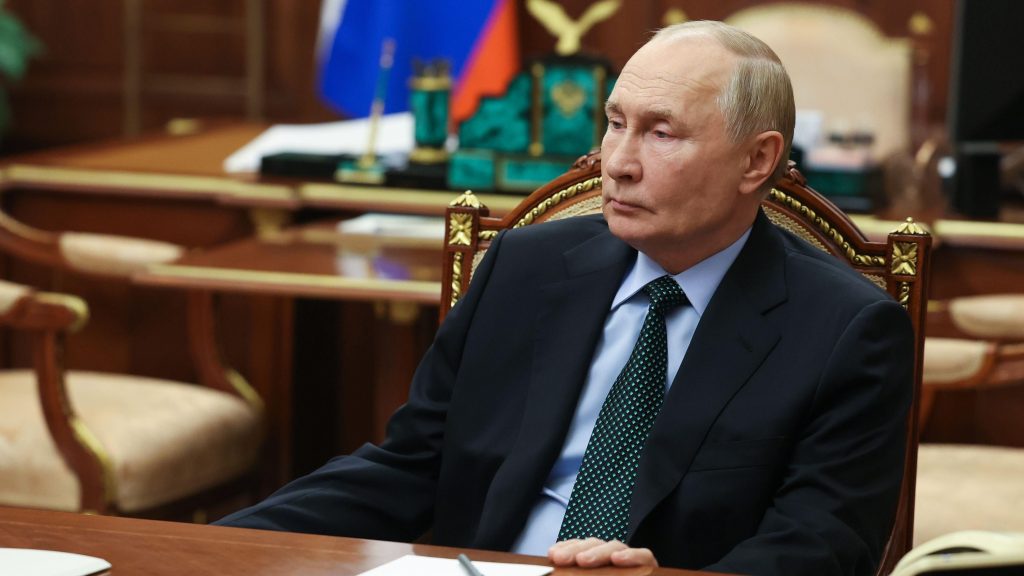Steve Rosenberg: After days of escalation, what will Putin do next?
4 min read
The question of “What will Vladimir Putin do next?” has become even more urgent this week. With a series of alarming developments in the ongoing war in Ukraine, both Western leaders and the Russian president himself seem to be on edge.
This week, the Kremlin leader signaled a more aggressive posture, especially regarding Russia’s nuclear capabilities. Putin made it clear that the use of nuclear weapons could be on the table, should any country supplying Ukraine with long-range missiles target Russian territory. “We consider ourselves entitled to use our weapons against the military facilities of those countries that allow their weapons to be used against our facilities,” he said. With such a declaration, Putin’s rhetoric raised fears of a further escalation in the war. And, given the complexities of the situation, the answer to “What will Putin do next?” remains uncertain. Even Putin himself may not know, which makes the situation even more precarious.
Escalation and the Putin Playbook
For nearly three years, the conflict in Ukraine has been marked by one steady pattern: escalation. While the Kremlin accuses the West of intensifying the war, it is, in fact, Putin who has embraced escalation to achieve his objectives—be it control over Ukraine or peace on Russia’s terms. Since the start of the war, Putin’s decisions have only pushed the conflict further. From the full-scale invasion to the annexation of Ukrainian territories, and the recent use of intermediate-range hypersonic missiles, every move has escalated tensions. Even the deployment of North Korean troops to the Kursk region signals a continued commitment to military escalation.
It seems unlikely that Putin, whom I once compared to a car with no brakes, will suddenly slow down. While Ukrainian forces will brace for more attacks, Western governments are on high alert for potential Russian hybrid warfare, including sabotage and arson, which could spill over into European streets. Putin has already suggested retaliatory actions, hinting at arming countries hostile to the West if Ukraine continues receiving Western-supplied missiles.
The Nuclear Threat
The issue of nuclear weapons looms large. The question often follows: “Will Putin use nuclear weapons in the Ukraine war?” Over the years, Putin has hinted at this possibility. When he launched the invasion of Ukraine in February 2022, he issued a veiled nuclear threat to any country considering interfering. “The consequences will be such as you have never seen in your entire history,” he warned. While these words were initially seen as nuclear saber-rattling, recent developments suggest that Putin may be serious.
In September, he lowered Russia’s threshold for nuclear weapon use. Since then, the West has crossed several Russian “red lines,” supplying Ukraine with tanks, advanced missile systems, and fighter jets. And now, the West has gone further, providing Ukraine with long-range weapons, including Atacms and Storm Shadow missiles that have targeted Russian territory. Putin’s response was a stern warning: a red line had been crossed.
The possibility of Russia using nuclear weapons, particularly tactical nuclear weapons, remains a critical concern. These smaller warheads are designed for battlefield use but could spark a catastrophic escalation if deployed. Russian military officials and analysts have hinted that the situation could spiral into a nuclear conflict if Putin’s emotional impulses override any rational consideration.
Putin’s Emotional Calculus
Putin’s decisions are often driven by emotion—resentment of the West and a desire to push back against perceived humiliation. Many experts believe that Putin’s invasion of Ukraine was, in part, an emotional reaction. But this volatility raises serious concerns. As Andrei Kolesnikov, a columnist for Novaya Gazeta, pointed out, Putin’s emotions can influence whether he chooses to escalate further, potentially leading to the use of nuclear weapons.
The threat of nuclear war may be intended as a tool of intimidation, but it also represents a very real risk of irreversible escalation. A tactical nuclear strike, while limited in scope, would mark the beginning of a much more dangerous phase in the war—a “suicidal escalation” for the entire world.
The Trump Factor
As 2024 draws closer, the dynamics of the war could shift with the upcoming U.S. presidential election. If Donald Trump wins, he has expressed skepticism about U.S. support for Ukraine, and has even suggested that talking to Putin would be a “smart thing.” This rhetoric would likely appeal to Putin, who may see a shift in U.S. policy as an opportunity to end the war on favorable terms for Russia.
This potential change in the political landscape means that, for now, the Kremlin may hold off on major military escalations. Putin may calculate that a more favorable resolution could be reached with Trump in the White House, leading to a pause in further aggression. However, should Putin’s calculations change, the situation could escalate quickly.
In conclusion, the question of “What will Putin do next?” remains unanswered. The ongoing war in Ukraine is highly fluid, and Putin’s next steps depend on a mixture of strategic calculations, emotional impulses, and the broader geopolitical situation, including the potential for a shift in U.S. leadership.








